Some baking advice holds true no matter the decade. We combed Newspapers.com™ to find 15 baking tips from vintage newspapers that still prove useful today! Have you tried any of them?
 24 Mar 1950, Fri Crawford Tribune (Crawford, Nebraska) Newspapers.com
24 Mar 1950, Fri Crawford Tribune (Crawford, Nebraska) Newspapers.com
1. Replace vanilla with almond extract in chocolate desserts (1954)
“When baking any kind of chocolate dessert—cake, puddings or cookies—try using almond extract instead of vanilla in the recipe. It gives a much more delicious flavor, I have found. Almond extract also does wonders for boiled frosting for a chocolate cake.”
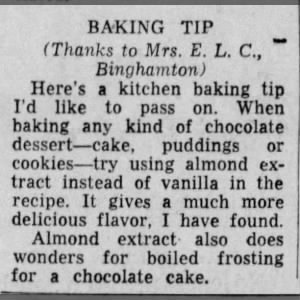 26 Apr 1954, Mon Press and Sun-Bulletin (Binghamton, New York) Newspapers.com
26 Apr 1954, Mon Press and Sun-Bulletin (Binghamton, New York) Newspapers.com
2. Warm the bowl, not the butter (1937)
“When butter is too hard to cream easily, heat the bowl slightly. Never warm the butter.”
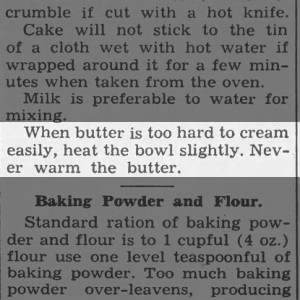 14 Jan 1937, Thu The Wayne Herald (Wayne, Nebraska) Newspapers.com
14 Jan 1937, Thu The Wayne Herald (Wayne, Nebraska) Newspapers.com
3. No buttermilk? Make a substitute (1940)
“Sweet milk soured with lemon juice may be used as buttermilk in baking soda recipes. Place 1 ½ tablespoons of lemon juice in a measuring cup and fill cup with fresh milk.”
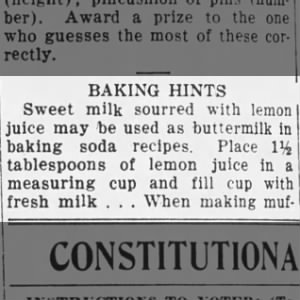 24 Oct 1940, Thu The Burley Herald (Burley, Idaho) Newspapers.com
24 Oct 1940, Thu The Burley Herald (Burley, Idaho) Newspapers.com
4. Use butter for a soft bread crust (1956)
“Baking bread? If you want a soft tender crust, slather the baked loaves with soft butter when you take them out of the oven.”
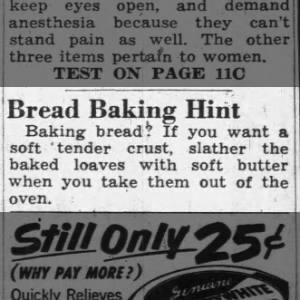 28 Feb 1956, Tue St. Louis Globe-Democrat (St. Louis, Missouri) Newspapers.com
28 Feb 1956, Tue St. Louis Globe-Democrat (St. Louis, Missouri) Newspapers.com
5. Let fruit-bread batter sit (1940)
“Most date or fruit breads rise better if they have been allowed to stand in the baking pan 20 minutes before they are placed in the oven for baking.”
 25 Apr 1940, Thu The Sheboygan Press (Sheboygan, Wisconsin) Newspapers.com
25 Apr 1940, Thu The Sheboygan Press (Sheboygan, Wisconsin) Newspapers.com
6. Use water to avoid over-browning bread (1953)
“If the oven is too hot and the loaves brown on top before the bread is baked, place a pan of boiling water on the top grate. The steam will keep the bread from scorching while the heat thoroughly bakes the rest of the loaf.”
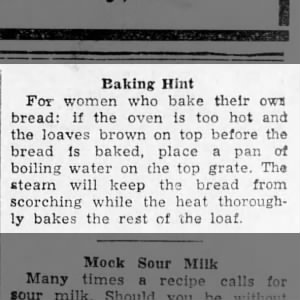 14 May 1953, Thu The Brockway Record (Brockway, Pennsylvania) Newspapers.com
14 May 1953, Thu The Brockway Record (Brockway, Pennsylvania) Newspapers.com
7. Skip rolling out cookie dough (1953)
“To save work of rolling dough, pull off walnut size pieces and flatten with bottom of tumbler covered with a damp cloth.”
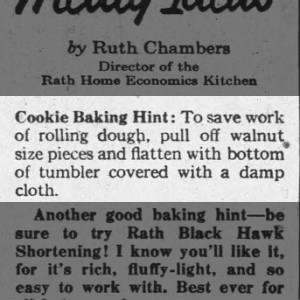 28 Apr 1953, Tue The Rock Island Argus (Rock Island, Illinois) Newspapers.com
28 Apr 1953, Tue The Rock Island Argus (Rock Island, Illinois) Newspapers.com
8. Bring cake ingredients to room temperature (1965)
“For best results cake making ingredients should be at room temperature—70 to 75 degrees. Remove eggs and butter or other shortenings from the refrigerator before you begin preparing the cake. At this recommended temperature, they give the greatest volume expansion during creaming, beating and whipping.”
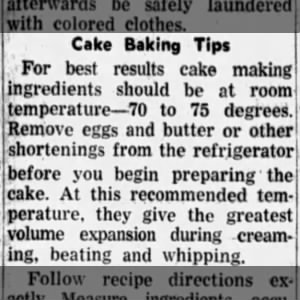 24 Mar 1965, Wed The Newton Record (Newton, Mississippi) Newspapers.com
24 Mar 1965, Wed The Newton Record (Newton, Mississippi) Newspapers.com
9. Pour cake batter around pan edges first (1952)
“When filling baking tins, start by pouring batter around the edges, work toward center. Leave center lower than sides. This will help prevent cake from falling.”
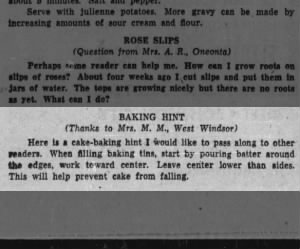 31 Mar 1952, Mon Press and Sun-Bulletin (Binghamton, New York) Newspapers.com
31 Mar 1952, Mon Press and Sun-Bulletin (Binghamton, New York) Newspapers.com
10. Don’t open the oven door too soon (1962)
“A cake in the oven? Don’t open that oven door until the cake has baked for at least half of its full time.”
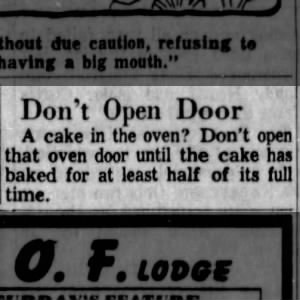 10 Mar 1962, Sat The Spokesman-Review (Spokane, Washington) Newspapers.com
10 Mar 1962, Sat The Spokesman-Review (Spokane, Washington) Newspapers.com
11. Avoid salted butter when greasing cake pans (1959)
“Do not use salted butter for greasing a cake pan; the salt in the butter is apt to make the cake stick.”
 23 Oct 1959, Fri The Baltimore Sun (Baltimore, Maryland) Newspapers.com
23 Oct 1959, Fri The Baltimore Sun (Baltimore, Maryland) Newspapers.com
12. Mix pie dough to pea-size lumps (1939)
“They say that the method of mixing is the secret of a flaky pie crust. The flaky crust results if the fat is mixed into the dry ingredients so that the mixture is in large lumps, some say about the size of a pea. A hard fat produces better results than a soft fat.”
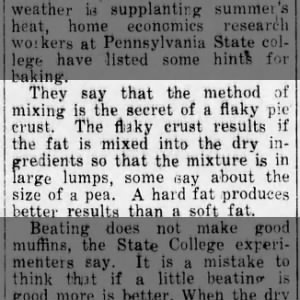 19 Sep 1939, Tue The News-Chronicle (Shippensburg, Pennsylvania) Newspapers.com
19 Sep 1939, Tue The News-Chronicle (Shippensburg, Pennsylvania) Newspapers.com
13. Easily cut a pie into 5 equal servings (1953)
“Next time you are serving a small pie to five, cut it this easy way. Cut it first in the shape of a large letter Y, then slice each of the two large pieces on each side of the Y in two.”
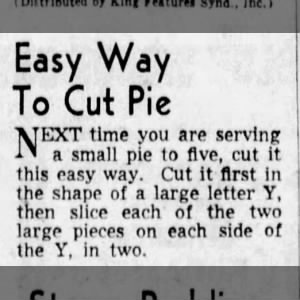 10 Sep 1953, Thu Pittsburgh Sun-Telegraph (Pittsburgh, Pennsylvania) Newspapers.com
10 Sep 1953, Thu Pittsburgh Sun-Telegraph (Pittsburgh, Pennsylvania) Newspapers.com
14. Leave muffin batter lumpy (1964)
“To achieve light, tender muffins, follow these few mixing and baking hints. Add the liquid ingredients all at once to the dry ingredients. Stir quickly just until the dry ingredients are moistened—the batter will be lumpy. Overmixing causes small, tough, “tunnelly” muffins.”
 08 Oct 1964, Thu The Shreveport Journal (Shreveport, Louisiana) Newspapers.com
08 Oct 1964, Thu The Shreveport Journal (Shreveport, Louisiana) Newspapers.com
15. Use a string to cut cinnamon roll & other filled dough (1960)
“Another baking tip—when slicing dough that has been filled with fruits, cinnamon, sugar, etc., use a string under the dough, bring to the top, cross and pull. This slices the dough but keeps the filling in where it belongs.”
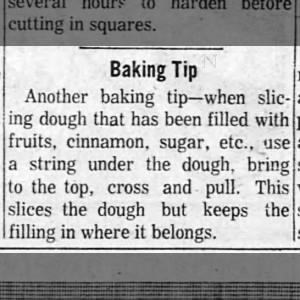 21 Jul 1960, Thu The Decatur Daily Review (Decatur, Illinois) Newspapers.com
21 Jul 1960, Thu The Decatur Daily Review (Decatur, Illinois) Newspapers.com
***
Got any favorite baking tips of your own? Share them with other readers in the comments!
Find more baking tips and tricks on Newspapers.com™! And follow us on Facebook, Twitter, Instagram, and TikTok for more content like this!


This has become a blog about random junk. Please go back to actually adding new papers in and adding coverage for gaps in existing ones. I look at the list frequently and it hardly ever changes and mostly the same papers for (current) years.